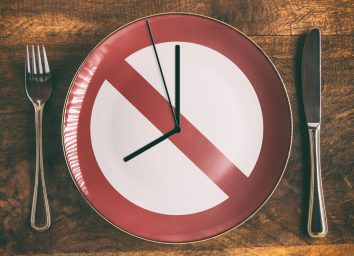5 Reasons You Haven't Seen Intermittent Fasting Results, According to Nutritionists

Over a third of U.S. consumers are currently dieting—and the majority of them are following intermittent fasting or IF. If you haven't yet been acquainted with the trend, IF is an eating pattern that involves abstaining from food for a specific period of time (usually overnight) and limiting meals to an eating window. Many people are interested in the diet because they can see intermittent fasting results in as little as 10 days.
What are the benefits of intermittent fasting?
Besides being linked to boosting your metabolism, "Research seems to be finding [IF] benefits to weight, blood sugar, inflammation, and potentially to brain health," Isabel Smith, MS, RD, CDN, and founder of Isabel Smith Nutrition and Lifestyle, tells us.
Why haven't you seen intermittent fasting results while following the diet?
However, while research shows that many folks are trying their luck with IF, people often find that they're not seeing optimal intermittent fasting results as quickly as they expected.
If you're not witnessing a trimmer waistline and bloat-free belly, don't quit just yet—you may be guilty of committing these five mistakes.
Find out how you can improve your IF experience and reap the results you've been dreaming of before throwing in the towel with our guide below.
Stop the following 5 bad habits so you can finally see the intermittent fasting results everyone raves about.
You chose the wrong eating window.

There are multiple IF plans, and there's no one-size-fits-all.
- 5:2 approach: This plan involves eating your normal diet five days out of the week and restricting your caloric intake to 500–600 calories for the remaining two.
- 8:16 approach: During the 8:16 approach, your eating window is 8 hours long during the day, and the 16-hour fasting period occurs overnight.
- Warrior Diet: This approach involves eating small amounts of produce during the day and indulging in a big meal at night.
- Eat-Stop-Eat plan: This is the method that involves one or two 24-hour fasts per week.
Because there are so many options, you may not be seeing intermittent fasting results if you're following the wrong IF plan for your lifestyle.
For example, if your weekdays involve hitting the gym for an a.m. sweat sesh, working overtime, and then rushing to get dinner on the table, the 5:2 eating plan may be too restrictive and leave you feeling famished—a recipe for IF failure.
"Some may find that a 12-hour fasting window is all they can do without major discomfort, while others do just fine with a 16-hour fast. For beginners, start with 12 hours and build up from there," Jim White, RDN, ACSM, EX-P, owner of Jim White Fitness and Nutrition Studios, explains.
You aren't eating enough calories.

Registered dietitian Amy Shapiro MS, RD, CDN of Real Nutrition NYC reminds us that not eating enough during your eating window and still trying to cut calories can backfire. "People often try to count the calories they eat during the window, however, that is not the point. The goal is to eat until you're full, which your body will tell you. By restricting calories, you will under-eat, causing unwanted changes in the body, which can be detrimental long-term," she tells us.
For successful weight loss and intermittent fasting results, White recommends specific calorie restrictions. (He also notes that caloric needs change based on levels of physical activity and age.):
- For women: 1,200–1,800 calories
- For men: 1,800–2,200 calories
"To avoid dipping too low in energy, which could compromise energy and productivity levels during your day, try eating three smalls meals and one to two snacks during your eating window," White advises. "Additionally, eating only one time a day can lead to extreme levels of hunger which would make it very challenging to make healthful choices at the moment and often lead to overeating."
You're eating the wrong foods during your window.

Just because IF focuses on your meal timing rather than macro-tracking, that doesn't give you the green light to engage in a junk food free-for-all.
"Eating the wrong foods during the eating window and not getting enough nutrients is often a problem while intermittent fasting," Shapiro tells us. "It is essential to nourish the body with nutrient-dense whole foods so that the body can break them down during the fasted state, keeping you satiated. People use IF as an excuse to eat the wrong things, such as processed foods and sugar, which is not good for the body during the fasted state."
To see intermittent fasting results, White recommends making the following healthy foods a priority in your diet:
- healthy fats
- lean proteins
- complex carbohydrates
- fiber found in fruits and vegetables
You're forgetting to drink water throughout your intermittent fasting diet.

Fasting or not, staying hydrated helps you fight off hunger and cravings. Shapiro reminds us how essential it is to drink up during the fasted state. "Since the body is breaking down components while you fast, water is needed to detoxify them and flush out the toxins. This can also help you to feel full," she says.
Try keeping a large reusable water bottle by your desk so you can sip throughout the day.
You're overtraining during the diet.

If you're planning to hit the gym during your IF period, make sure not to overdo the HIIT circuits or else you may not see the intermittent fasting results you were expecting.
Of course, your workout schedule will depend on which IF diet you're following:
- 8:16: If you're following 8:16 and skip your usual breakfast, engaging in a morning workout on an empty stomach will leave you feeling extremely low on energy and could impact your workout performance and speed of muscle recovery, White says.
- 5:2: Similarly, working out during the calorie-restricted days on 5:2 won't help you get the most out of your workout and leave you feeling ravenous. "The body has to be eased into the process of IF. The process works if you do it correctly, but eating too little and training too hard can lead to adrenal fatigue.
Working out is great, but too much stress on the body will be a problem," Shapiro tells us. Planning to take a stab at this trend? You'll want to see what happens when someone tries intermittent fasting for 10 days.








